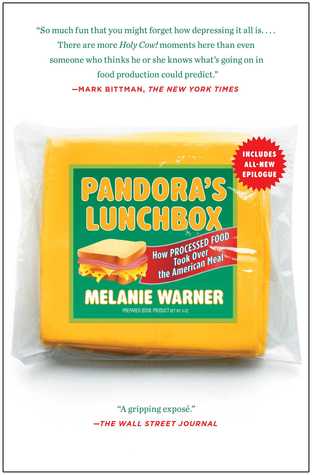 |
| Baby, don't hurt me, don't hurt me no more |
We'll put down the Coca-Cola and reach for the Vitamin Water. We'll bypass the french fries for the whole-grain cereal. But are the "healthy" alternatives any healthier?
Recently I read another food-industry-investigation book, this one called Pandora's Lunchbox by Melanie Warner.
If you've run the gamut of food books, from Michael Pollan's oeuvre to Salt Sugar Fat and their ilk, you won't find a whole lot new in this book, although I did find a few interesting nuggets:
- Digesting a meal of whole, unprocessed foods raises your metabolic rate almost 50% over a meal of processed.
- When Kraft started producing processed cheese, WI cheese makers wanted it called "embalmed cheese."
- If soybean oil weren't bleached, it would be reddish-orange and contain beta carotene.
- There are 2 ways to fix our omega-6/omega-3 imbalance: eat 6-10 ozs of salmon/day (until all the salmon are overfished and gone) or cut back on processed food.
- Most of the 5000 food additives allowed are industry self-regulated and untested. (Basically a wait-until-somebody-gets-sick approach.)
Warner also includes a chapter called "Healthy Processed Foods," to look into such novelties as "resistant starch," which is "molecularly rearranged to withstand human digestion"--like fiber! Most natural fibers get broken up or removed during processing, so food manufacturers generally have to add it back in. Yes, resistant starch resists digestion, but can it reproduce the complexities of natural fiber, which comes with its own nutrient benefits that the gut processes in its equally complex ways? Who knows.
Warner notes that, "between 2007 and 2011, among the eight thousand packaged products evaluated, healthier choices made up roughly 40 percent of sales but generated more than 70 percent of sales growth." "Healthy" is good business. And "healthy," as defined by the food industry means reducing sugar and fat and generally replacing them with other cheap ingredients: "zero-calorie sweeteners, starches, gums, or taste-modification molecules." Genuine healthier food items require whole ingredients and less filler--hence the high prices of KIND bars which I remarked on earlier.
Can you find healthy processed foods? Since I don't think even a KIND bar can technically be called a healthy food (it's more like a healthier candy bar), the options are slim. There are roasted nuts in cans, frozen fruits and vegetables, unsweetened yogurt, plain old rolled oats. But, as always, the answer seems to be, if you want real healthy--genuine healthy--the only guarantee is to buy it yourself and cook it yourself.
Our farmers market offers the best of both worlds: whole foods from a farmer or vendor who can tell you exactly where it came from and how it came to be, and processed foods, where the vendor can tell you exactly where it came from and what went into it. No weirdness, no chem lab, no fillers.
So, fine, skip the McDonalds and the Coca-Cola. Our Market offers tuna and beef jerky, all kinds of baked goods, yogurt just waiting to be swirled with artisan jam, Hosui Asian pears, roasted peanuts, crisp apples and multiple varieties of pear--all to be washed down with fresh-pressed ciders or even Washington wine. Do these offerings cost more than the storebought ones? Sometimes--in the short run. The final tally on the processed foods won't be determined for years, but if the rising levels of obesity and metabolic syndrome and food allergies are any indicator, those "foods" have their own hidden price tags.


No comments:
Post a Comment
Note: Only a member of this blog may post a comment.